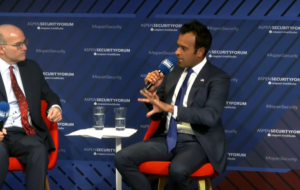A co-leader of the new commission set to advise President-elect Trump on potential cuts to government spending said Wednesday the debate over the Pentagon’s budget topline should focus on ensuring the department pursues the “right kind” of spending, while calling for more investments in technologies like drones and hypersonic missiles.
Entrepreneur and former presidential candidate Vivek Ramaswamy, who has been tasked to lead the Department of Government Efficiency (DOGE) alongside Tesla [TSLA] and SpaceX CEO Elon Musk, offered a view into the commission’s outlook on defense spending ahead of an expected visit with Musk to meet with lawmakers on Thursday.

“This broader discussion of, ‘Oh, if we spend less on defense that means we’re going to be less secure and if we spend more that means we’re going to be more secure.’ That’s a faulty premise. The real question we ought to be asking is what type of investment and what type of spending is actually going to achieve the goal of the U.S. Defense Department, which is to protect the U.S. homeland, to stay out of wars and, God forbid, if we are in wars to win them,” Ramaswamy said at an Aspen Security Forum discussion in Washington, D.C.
Ramaswamy offered that DOGE may take a look at the types of investments the Pentagon is making, adding that DoD is currently spending a “shockingly and alarmingly tiny percentage” of its budget on drones and hypersonic missiles.
“If you actually want to make real improvements to the defense and security of the United States of America, we would be investing more in drones [and] we would be investing more in hypersonic missiles rather than in a wide range of other expenditures for new kinds of fighter jets or whatever that aren’t the highest [return on investment] use of the dollar to even protect the best interest of the United States or to protect the United States itself,” Ramaswamy said.
Musk recently offered similar comments, specifically on the F-35 fighter aircraft, stating the platform’s design “was broken at the requirements level because it was required to be too many things to too many people” (Defense Daily, Nov. 25).
“This made it an expensive & complex jack of all trades, master of none. Success was never in the set of possible outcomes,” Musk wrote in a recent post on X, the social media site he owns. “And manned fighter jets are obsolete in the age of drones anyway. Will just get pilots killed.”
Ramaswamy on Wednesday also said its “unconscionable” that the Pentagon fell short of passing an audit for the seventh consecutive year.
“But, again, [there’s] this historical lazy debate about whether or not does that mean [there should be] more or less defense spending versus asking the question of actually are we deploying the right kind of federal spending,” Ramaswamy said.
Mike McCord, the Pentagon’s comptroller, has said the department is showing progress on its goal to achieve a clean financial opinion and pass its audit by 2028 (Defense Daily, Nov. 18).
The DOGE will serve as a non-governmental advisory commission to Trump, with Ramaswamy reiterating on Wednesday he was “giving [his own] perspective” as it relates to defense spending discussions.
“We’re offering, as I said, recommendations from the outside. But it’s an example, it’s a lens, it’s a mentality [about] what actually maximizes the [return on investment] (ROI) of the taxpayer dollar,” Ramaswamy said.
While the DOGE itself won’t be able to make direct cuts, Ramaswamy did offer insight into how the executive branch could implement the commission’s recommendations without requiring Congressional action.
“The first step is going to be what can be done through existing executive authority, without relying on Congress to take those steps. There’s historically been a philosophy, of course, the executive [branch] can’t spend money if Congress hasn’t authorized it. But if Congress has authorized it and yet it’s being spent in a wasteful or in an unethical or in a fraudulent or even in an error-prone manner, that’s a one-way ratchet to be able to turn that down,” Ramaswamy said. “And I hope those winds lay the foundation for Congress to say, ‘Hey, you know the sun still rises in the East and sets in the West. Nothing broke. People aren’t worse off. People are better off, actually, as a consequence of making these changes.’ That gives them then the courage to make the legislative changes needed to pare back spending in ways that do have to go through statute. That’s the way I see this playing out.”
Sen. Joni Ernst (R-Iowa), a member of the Armed Services Committee, has led the founding of a DOGE Caucus in the upper chamber, while Reps. Aaron Bean (R-Fla.) and Pete Sessions (R-Texas) are co-chairs of the House DOGE Caucus and Rep. Marjorie Taylor Greene (R-Ga.) will chair a new Delivering on Government Efficiency (DOGE) Subcommittee.